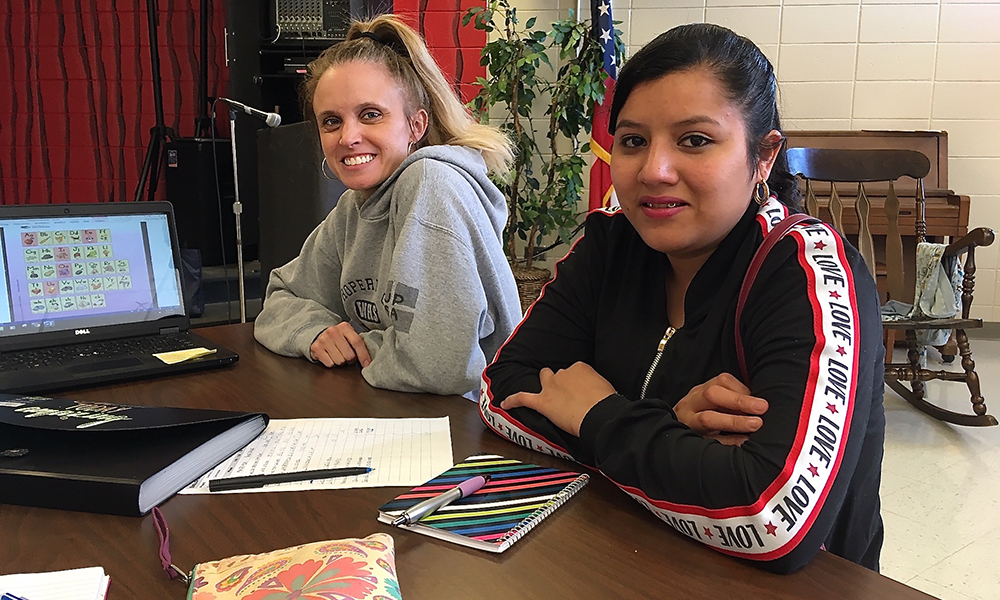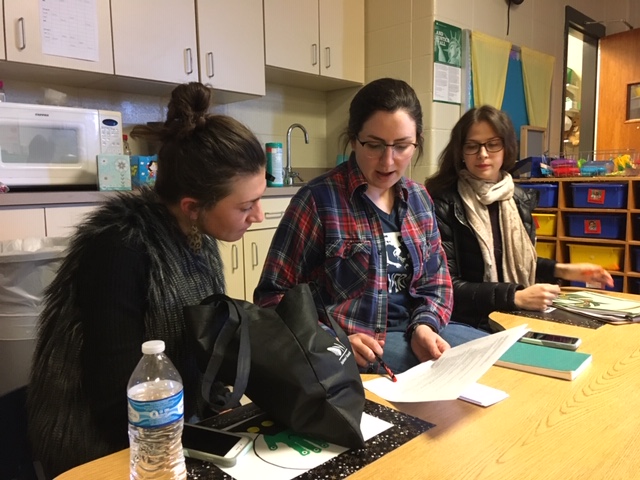
Photos by Stell Simonton
An English lesson by teacher Carrie Madden (left) is part of the after-school program offered to parents at Norton Park Elementary in Smyrna, Ga. It helps parents acculturate to the United States while their children learn social and emotional skills after school. One goal is to reduce the chance of youth gang involvement in the future.
Two hours after the school day ended, three parents sat in the nearly empty cafeteria at Norton Park Elementary School in a suburb north of Atlanta.
They looked toward a screen several sentences were projected on.
“Is this a good command or a bad command?” asked Allison Garefino, part-time assistant professor in the psychology department of Kennesaw State University.
One parent translated a sentence from Spanish: “I want you to pick up the Legos please.”
It’s not a good command, Garefino said.
“It’s not direct. It just expresses a wish,” she said. How can we fix it, she asked?
“Pick up the Legos, please,” a parent replied.
While the parents discussed effective commands and parenting strategies with Garefino, who is also clinical director of Children and Family Programs at Kennesaw’s Center of Conflict Management, their children played a relay race in the hall. In each leg of the race, the kids handed off a balloon to a teammate.
When the game ended, teacher Kasey Barber asked: “Out of our social skills, what do you think we used?”
“Teamwork!” a small boy exclaimed.
Risk, preventive factors
In the guise of play, the kids were learning to identify and practice various social skills, while the parents practiced their English and parenting skills and learned more about the local community.
This Title I school in Smyrna, Ga., with a high population of immigrant children is the site of a two-pronged after-school program to acculturate parents new to the United States and reduce the risks faced by their kids.
Statistics show that 85 percent of children of foreign-born parents have experienced separation from a parent or family member, Garefino said.
“Any separation can have long-term negative outcomes,” she said.

Kennesaw State University students and Grants Manager Kelly Hoffman (right) of the Children and Family Programs at the university’s Center for Conflict Management prepare a lesson on teamwork and cooperation for children in the after-school program at Norton Park Elementary.
Immigrant children are more likely than others to feel the loss of family, identity and community, she said.
The program she devised is funded by the JAMS Foundation, which focuses on conflict resolution education and services.
Research shows that one of the best predictors of academic success among immigrant children is maternal proficiency in English, Garefino said. On the other hand, trauma, violence, separation and loss are among the risk factors for youth involvement in gangs, she said.
Schoolchildren acculturate faster than their parents and this can change their sense of identity. “That’s where the loss comes in,” Garefino said.
And the literature on gangs indicates kids join gangs to try to find a community, she said.
The program at Norton Park addresses a number of risk and preventive factors.
Children learn pro-social skills that help them address conflict constructively. Through various activities, they are taught communication, cooperation, participation and validation skills, as well as emotional regulation techniques.
Parents learn strategies to lessen family conflict and children’s potential anti-social behavior. After each parenting discussion, teacher Carrie Madden offers an English lesson.
The after-school sessions for parents also provide information about the community and ways to connect to it. For example, parents were introduced to Cobb County’s PASS program, which gives all children with a student ID automatic access to the county library system.
Parents may have experienced a loss of community and feel uprooted, Garefino said. The after-school program tries to build a greater sense of community.
Garefino’s goal is to train teachers who will eventually take over the program. In addition, she plans to bring the skills training to the whole school as a part of its roll-out of a behavior management system known as PBIS (Positive Behavioral Interventions and Supports) that the school district is adopting.
The skills taught in the after-school program can work with anybody — “your dog, your neighbor, your boss,” Garefino said.
“Our goal is to help all kids be successful,” she said.





























